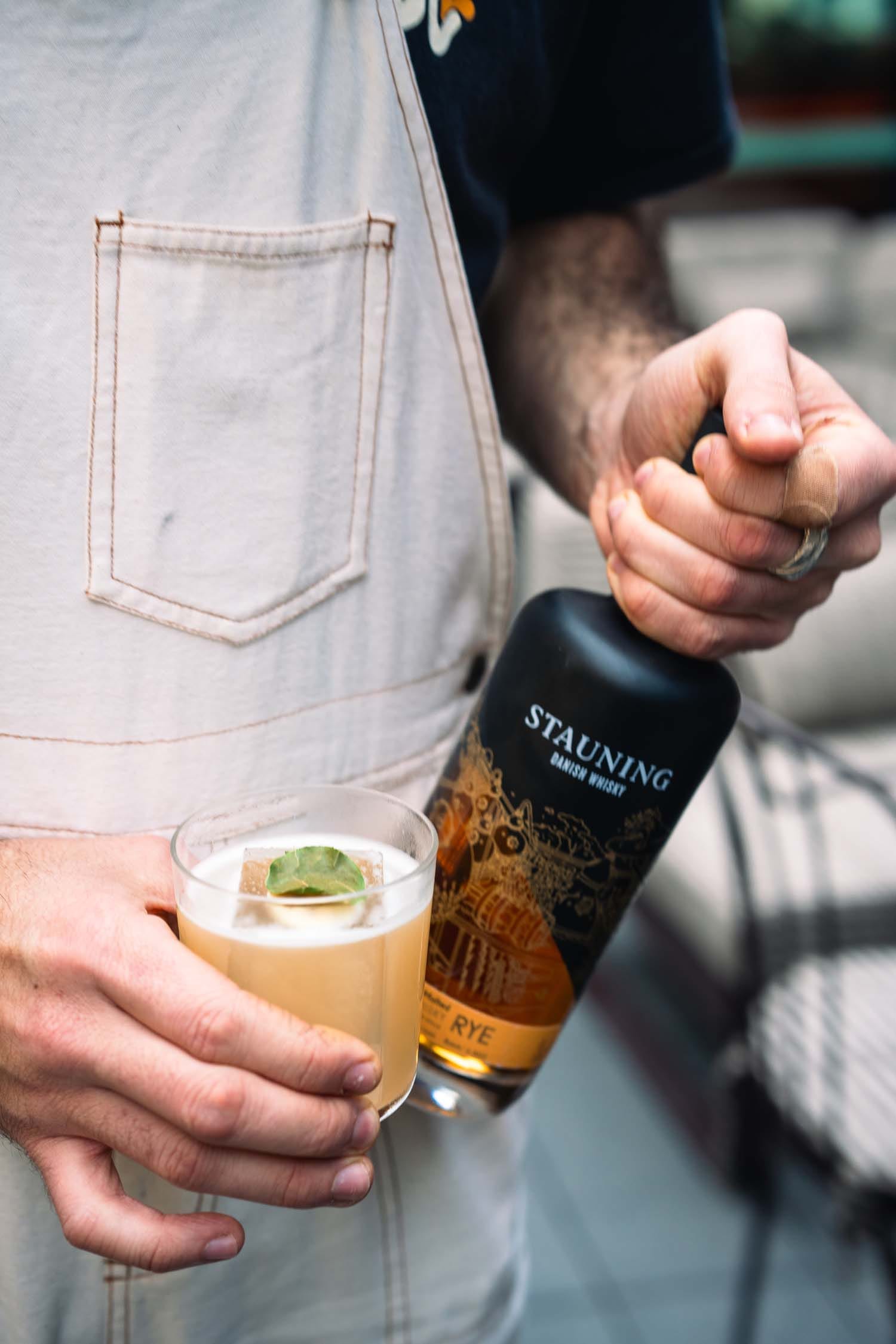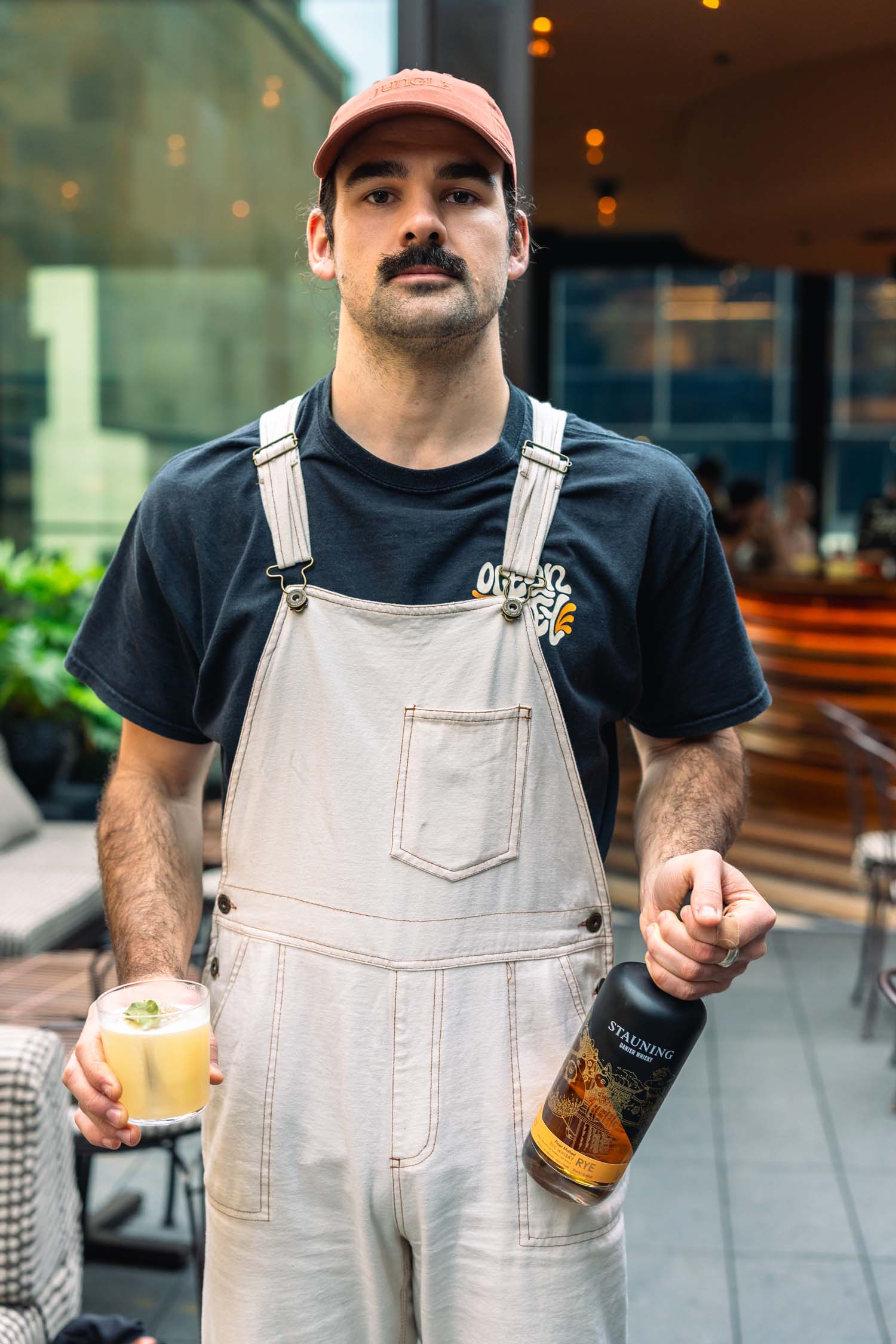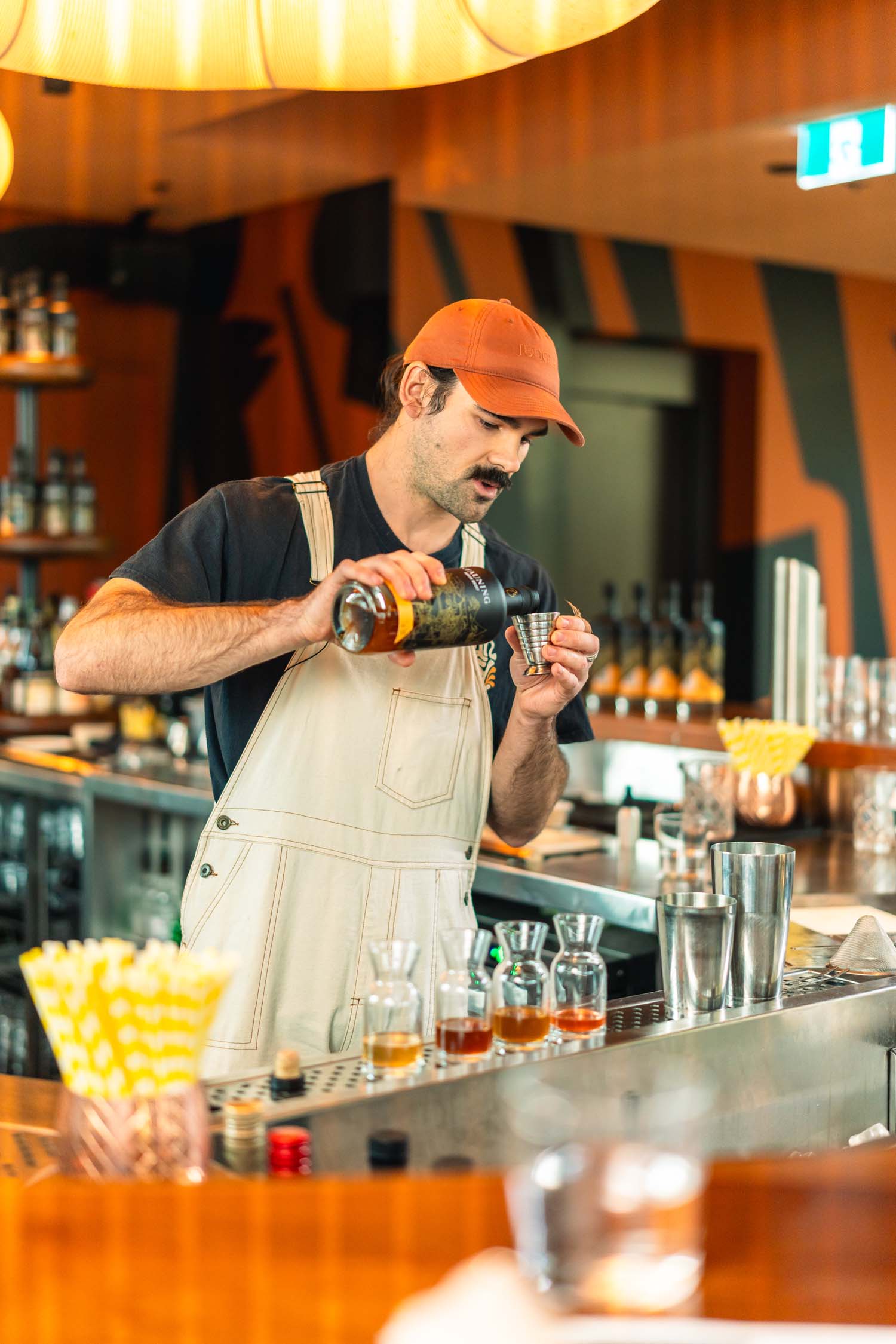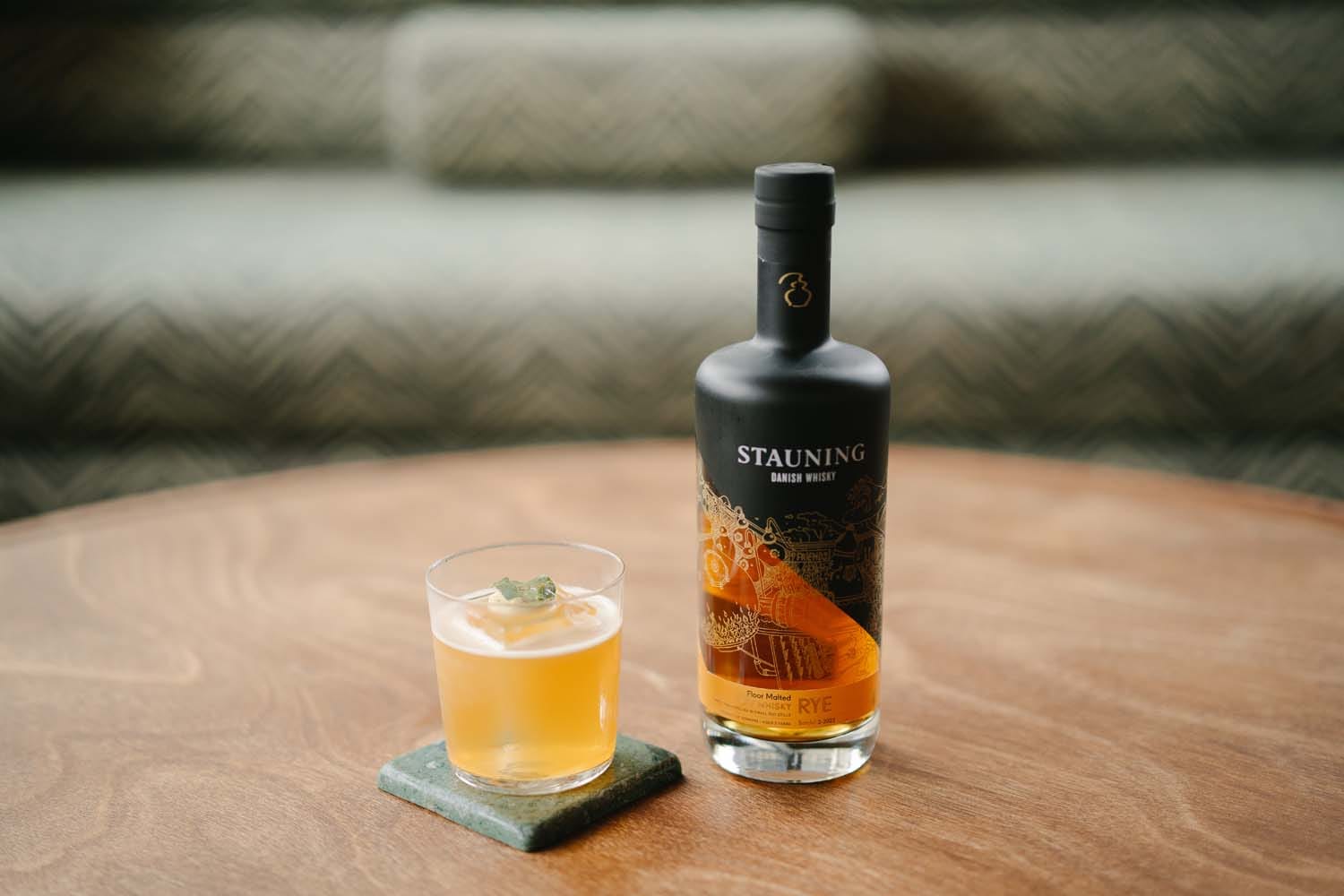At Shell House in Sydney on Tuesday, eight bartenders from across Australia gathered to compete in the national final of the Stauning Drinks Kollektive cocktail competition.
It’s the first global cocktail competition for the Danish whisky brand, and at stake for the bartenders at Shell House was a ticket to the global final in Copenhagen in September to compete against winners from the UK, the USA, France, Germany and Denmark.
I had the privilege of joining Stauning global ambassador Ali Reynolds and Caterpillar Club venue manager Felicity Eshman to judge the competition. Stepping behind the bar to create their cocktail — using either the Stauning RYE or Stauning HØST — was Aydin Coskun (Whisky & Alement), Cara Reedy (Continental Deli), Doris Gao (PS40), Eduardo Conde (El Primo Sanchez), Katie Zarb (Rude Boy), Kieron Sommer (The Baxter Inn), Kishen Rao (Volstead Repeal), and Tom Opie (The Waratah).
Each bartender handled themselves well behind the bar, and the standard of drinks was high — they were all drinks we’d be happy to order a second time. But, as you might have guessed from the title of this piece, there was one bartender who had a better day than the rest.
That bartender was Tom Opie. He talked a lot about sustainability — a key element of the competition, along with locality and design — in a way that was both engaging and meaningful. His drink, Ubuntu — named for a South African proverb that means ‘I am because we are’ — was delicious.
Below, lightly edited and condensed for clarity, Tom talks to me about what he did to win the competition, what he’s looking forward to, and what the win meant to him.

Stauning Høst Double Malt Whisky is a smooth, fruit-forward, and floral whisky, made in Denmark with a marriage of single malt and malted rye whisky, aged in American oak casks and with a touch of Port wood. You can learn more about it here.
Stauning Rye Whisky is made from 100 percent locally sourced, floor-malted Danish rye and barley, double distilled in direct fire small copper stills and aged in virgin American white oak barrels. You can learn more about it here.
You can get Stauning Danish Whisky from The Whisky List by contacting Scott Allan at scott@thewhiskylist.com.au, or check out the full range in ALM. For more information, follow Stauning on Instagram at @stauningwhisky and hit up The Whisky List at @thewhiskylist and online at thewhiskylist.com.au.

So you’ve just won the Stauning Drinks Kollektive national final. Where do you go now?
Yeah, apparently Copenhagen. It’s pretty sick. It’s one of those places that when you’re traveling in Europe, you’re like, it’s too expensive to go to Copenhagen — I don’t know if I’ll go there.
So for people who weren’t here, what was the idea behind your drink?
So Ubuntu is a South African proverb that means ‘I am because we are.’ It’s about the collective.
What does that mean to you, that particular phrase?
When we talk about one thing, it doesn’t exist because of its singular existence, you know what I mean? Nature, we’re talking about the soils, and the microbes in the soil, and they’re built up by not only natural forces, but us too. And that’s the same as Stauning, which is this collective of people, it’s local sustainability, fostering all these kind of local businesses and community to create this thing that is more than the sum of its parts.
Knowing you a bit I feel like this is really in your wheelhouse, right? Sustainability is the stuff that you care about, and when you were presenting it looked like you really meant what you’re saying — it’s definitely authentic to you. Why is it important to you?
Sustainability to me is probably the most important thing. When I was 19 years old and I was a far left guy, I was like, I want all the coal mines out of the world and stuff. And now I am understanding that we can’t just start again. I think it’s the learning of what sustainability is, in terms of buying from local producers, fostering those local guys who come in and spend their life doing what they do. But it’s also the things like, instead of throwing out feijoa skins, using it in a drink that is tasty. The plant worked hard to make that, you know what I mean?
You said you were using feijoa skins in your drink because you had to peel hundreds of them for The Waratah, is that right?
Yeah so I cut them open, scoop them out.
Is that something you’re using in service at the moment?
So right now Peter Dryden [a fruit providore The Waratah uses] doesn’t have any because the season’s over, but I took so many of those skins and fermented them because there were big bowls full of feijoa skins. I was eating it, and I was like, this is delicious. So I’m going to make something out of this. And I fermented a bunch of them.
There’s no point in throwing them out because they’re tasty and Peter Dryden works hard for it.
Why is it important for you to work with people like Peter Dryden? Is there’s some significance there for what comes out in the drink?
Yeah, of course. When we’re talking about the microbes and the soil and allowing them to express themselves, it’s better fruit because they’re taken care of better. It tastes better. It’s a lower carbon footprint — it’s not in these giant Woolies trucks that are driving through the CBD getting stuck in half an hour of traffic. Peter comes down in his little Volvo and he’s like traveling to all these bars dropping off these bags of feijoa and they’re soft, they’re ripe, and you can taste the quality. He really cares.
And the story is really important too, right? If I tell you that Peter Dryden is the Santa Claus of produce, he drives around and gives us all these amazing fruit that you cannot get anywhere else — that he only grows on his farm. It’s a pretty cool story.

Why’d you want to enter the Stauning Drinks Kollektive?
They brought some samples down and tasting them I thought that’s pretty good gear. They clearly care about spirit. They’ve got some amazing processes that they use that other distilleries don’t. I think that’s something that really pertains to the story of it all. When you think about new products, I want something with a new story, something new I can talk about.
Why is the story important to you?
The connection to the story makes the spirit taste better. It makes us more likely to use it and want to use it. It’s that personability of it all.
What did it feel like getting up there and presenting to the judges and going through this competition? How do you feel right now?
Right now I feel amazing.
How did you feel before you got up there?
I felt really nervous, man.
You didn’t look nervous.
Well, that’s great. And maybe that’s because I practiced a lot and I really nailed down points. In my last comp, I forgot my speech and that kind of gives me the yips a bit, you know? You’re like, what if that happens again? But today I felt I started to get into a flow and there was even parts where I didn’t really plan on saying what I did. So it was nice to get in that flow, which I haven’t really experienced before.
You weren’t relying on those crutches in your chat, where people get up and say, I’m gonna put this ingredient in now and it relates to this because of this reason. You weren’t doing that, you were telling a story and the drinks was happening at the same time. Was that conscious on your behalf, the way you wanted tell the story?
Yeah, I think one thing my last comp did was allow me to go deeper into the story, because I care very much about Aboriginal heritage. But I think this one, I wanted to go deeper on this as well, because Evan [Stroeve, owner of The Waratah] talks about the story of produce, and how you want to give the ingredients, but you want to say they have more of a life than just flavour. Because story is flavour.
How are you feeling about competing in Denmark?
I feel like we can give it a crack and just enjoy the experience, man. I think that’s what life’s about.
Where do you feel like you’re at in your bartending career at this moment in time?
I feel like I know nothing. I feel like I’ve got so much to do. I’ve worked really hard and my knowledge and confidence and has grown over the years.
I never want to stop learning. I never want to stop getting better.
You’re a humble guy. You’re not the type who thinks he’s got the answers to everything.
No, absolutely not.
But you’ve got some knowledge now, I’m sure. You’ve got some experience.
Yeah, exactly. And you get that by failures. I think that’s really important — not to get knocked down by your failures but to learn from them. Like, what are my strengths here? It’s a hard way. Sometimes when you don’t do well at something, you feel real rough.

What is it about you and your mindset that allows you to go, okay, I failed, but to keep going?
Yeah, I think growing up I was very privileged, I’ve had difficulties with anxiety and depression through about 20 to probably 26 years old, and I still deal with it sometimes. But I deal with it a lot better now and I think getting up and going again, even when I was at my worst, is something that I want to continue doing.
I have this real motivation to just keep getting better, not only in drinks and friendships and stuff, but just every day one percent better — what can you do better?
Right now my better is trying to be the best in terms of bartending, but also be the best in terms of, I want to be a nice person. And I want to inspire people who do have anxiety and depression, drinking problems, gambling problems, whatever, because I had all that. I want to inspire them to keep going.
Last question for you. How did you come up with the story for this competition? Where does it come from? That seemed like good writing to me.
I don’t know man, maybe it’s my ADD but I have these moments where I just do things. So my drinks will come from moments — I’ll have a moment and I’m like, right, it’s this. And then I’ll write it down, try and connect the dots and then make it later.
And that story today I wrote on the train because I’ve been commuting up and down. I was was actually listening to a podcast called The Imperfects and Billy Slater was on. Billy Slater was talking about how he uses the term Ubuntu with his team because they’re more than the sum of their parts. Just say they’re the best in the world, but they’re not the best because of themselves. They have this whole team around them. And that really spoke to me.
Then I just wrote it and refined it a little bit. But most of it was written in two trips I guess. It just kind of happens in moments. I think I’m really lucky like that.
A reminder that you can get Stauning Danish Whisky from The Whisky List by contacting Scott Allan at scott@thewhiskylist.com.au, or check out the full range in ALM. For more information, follow Stauning on Instagram at @stauningwhisky and hit up The Whisky List at @thewhiskylist and online at thewhiskylist.com.au.









